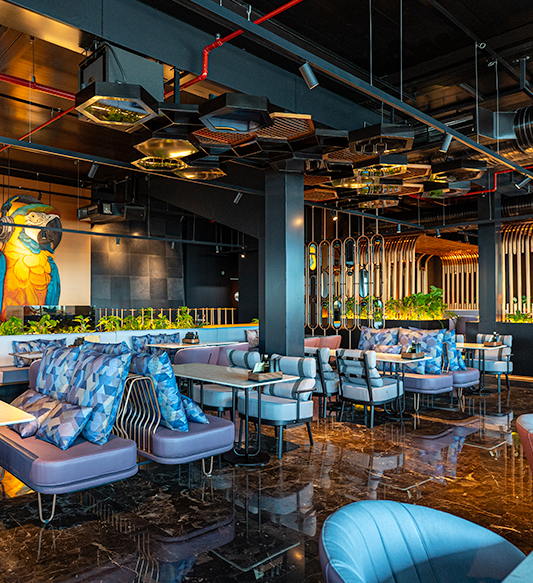


Smaller spaces have their own charm and benefits. Evidently, it is much easier to organize and requires less furnishing. Smaller spaces are usually cosier and allow for more creativity if they are designed properly. Or else, space constraints can stifle the enthusiasm and bring down productivity.
Pinnacle Interiors offers the latest interior design solutions that can significantly enhance the aesthetics of small living and work areas. As the leading interior design company in Dubai, we have the expertise to transform apartments and offices with limited spaces into stunningly stylish and functionally superior areas.
Let us examine how the vexing issue of “small space” can be tackled in a creative manner. Various design ideas are employed to overcome the space constraint and create a “bigger space” feel.
Paint and Color
Colors can significantly enhance the welcoming ambiance of small areas by creating the illusion of a bigger space. A clever use of dark and light colors can give the desired contrast and add depth to the space, making the space look larger and comfortable.
Small rooms may not always be a perfect square or rectangle in shape; they may be narrow on one end and wide on the other. Paint the narrow walls using one or two shades of a slightly darker color to make them appear wider. It also gives the impression of a square space.
Beyond this, interior designers use other painting strategies to improve the comfort level of small spaces. They include using a single shade of paint to give the space a welcoming continuity and make it more comfortable and employing horizontal stripes that make the space look wider and vertical stripes to make it seem taller.
Furniture
Furniture plays a critical role in making a space appear larger. Putting furniture against the wall makes the room appear smaller. Obviously, large pieces of furniture are not recommended for limited spaces. However, if you have tall pieces of furniture, it makes sense to place them against the wall to avoid breaking up the room.
Mirrors
Mirrors make for an excellent design solution that can improve the comfort levels of a small room. Hanging mirrors play with sunlight and enhance the appeal and ambiance of small spaces. When we talk about kitchens with limited space, backsplash mirrors can do wonders. They greatly improve the artificial lighting under the counter.
Full-length wall mirrors are a good strategy. They reflect ample light and bring a lot of vibrance and positivity to the room, effectively nullifying the negative effect of limited space.
Create flow with flooring
Continuous flooring throughout the space creates a feeling of expansiveness.
Floorboards are the latest fad, and they really work! Floorboards can be confidently used across small kitchens, living rooms and bedrooms.
Rugs can give a positive makeover
Rugs are another effective means to make spaces appear larger. Go for a minimalist approach, though! Aesthetically appealing rugs add warmth without visually shrinking a space. Choose a rug with a simple design as against rugs featuring elaborate and complex design elements. Vertically striped rugs are highly recommended for small rooms.
Choose simple window treatments
Window treatments deserve a lot of attention. Valance curtains make a room look smaller, so need to be avoided altogether in small rooms. Always go for minimalist window treatments like rolling blinds that allow you to cover the window without taking up much space. Another way is to install tracks for hanging the curtains rather than fixing them on the walls. Wall-length curtains made of light fabrics help create a tall-room effect. Full blackout curtains need to be installed with caution.
Go for minimal décor
The most powerful interior design mantra for smaller spaces is “minimal décor”. Decorate you must, but with restraint. You must be wisely selective and use the rule of proportions to render a “larger and spacious” effect to small areas. Arrange essential items in a balanced manner to give a welcoming visual appeal. Leave as much open space as possible to enhance functionality and psychological comfort.
Categorising and grouping décor pieces is also a good idea. Placing small décor items in a tray can effectively eliminate visual clutter. Also, use large-scale wall hangings and artworks on the wall rather than going for a gallery display approach.